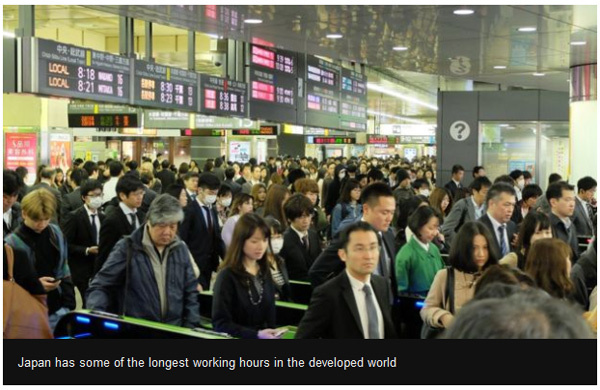当前位置: Language Tips> 双语新闻
Japanese firm to use drone to force overtime staff to go home
近年来,“过劳死”已经成为日本严重的社会问题,引起各界的高度重视。迫于政府的压力,企业也开始出奇招来应对“过劳死”问题。日前,一家日本公司就计划用“音乐无人机”来驱赶加班的员工。专家表示,如果活儿没干完,回家不是一样要继续干?这就是个骗局。

A Japanese firm is planning to use a drone to force employees out of their offices by playing music at them if they stay to work evening overtime.
一家日本公司计划用无人机对着晚上加班的员工播放音乐,迫使员工离开办公室。
The drone will fly through offices after hours playing Auld Lang Syne, which is commonly used to announce that stores are closing.
无人机在下班时间后会飞过一间又一间办公室,播放《友谊地久天长》。这首乐曲通常在商店打烊的时候播放。
Japan has for years been trying to curb excessive overtime and the health issues and even deaths it can cause.
多年来,日本一直试图遏制过度加班以及由此引发的健康问题,甚至过劳死。
Experts were unimpressed, one branding it a "silly" idea.
专家们对该公司的这一举措反应冷淡,一名专家还认为这个主意“很蠢”。
According to Japanese media, office security and cleaning firm Taisei will develop the device with drone maker Blue Innovation and telecommunications company NTT East.
据日本媒体报道,主营办公室安保和保洁的大成公司将同无人机制造商“蓝色创新”和电信公司NTT East联手研发这款无人机。
The camera-equipped drone will take flights through the office space playing the famous Scottish tune.
这款配备了摄像头的无人机将在办公区飞行,同时播放这首著名的苏格兰乐曲。
"You can't really work when you think 'it's coming over any time now' and hear Auld Lang Syne along with the buzz," Norihiro Kato, a director at Taisei, told news agency AFP.
大成公司的一位名叫Norihiro Kato的主管告诉法新社说:“当你想到无人机随时可能过来并将听到伴随着嗡嗡声的《友谊地久天长》,你就干不下去了。”
Taisei plans to start the drone service in April 2018 as a trial within their own company and later in the year offer it to others.
大成公司计划从2018年4月起启动无人机服务,先在自己的公司试运行,然后明年晚些时候开始对外提供服务。
这种无人机真的能有效地杜绝加班吗?来看看专家怎么说。
"Will this help? The short answer is: no," Seijiro Takeshita, professor of management and information at the University of Shizuoka told the BBC.
日本静冈县立大学管理和信息学教授Seijiro Takeshita告诉BBC说:“这会起作用吗?简短的回答是:不会。”
"It's a pretty silly thing and companies are doing this just because they have to be seen to be doing something on the problem."
“这种做法挺蠢的,这些公司这么做是为了让人们看到他们为了解决问题已经有所行动。”
The issue of excessive overtime is deeply rooted in the work culture and should be tackled from a more fundamental basis, he argues.
这位教授指出,过度加班的深层次原因在于日本的职场文化,应该从根源解决问题。
"Creating awareness is of course very important - but this is almost a hoax in my opinion."
“让大家意识到这个问题当然很重要——但在我看来这就是个骗局。”
Scott North, professor of sociology at Osaka University, said: "Even if this robotic harassment gets workers to leave the office, they will take work home with them if they have unfinished assignments."
大阪大学的社会学教授斯科特•诺斯说:“就算这个扰民的无人机迫使员工离开了办公室,如果任务没有完成,他们还是得带回家继续做。”
He added: "To cut overtime hours, it is necessary to reduce workloads, either by reducing the time-wasting tasks and tournament-style competitions for which Japanese workplaces are notorious, or by hiring more workers."
他还说:“要减少加班时间,就必须减少工作量,要么减少浪费时间的任务和日本企业间臭名昭著的荣誉之争,要么雇佣更多人手。”

Japan has long been struggling to break its decades-old work culture where it is frowned upon to leave before your colleagues or boss.
长时间以来,日本一直努力要打破延续了数十年的职场文化,在这种文化下,先于同事或领导下班是让人不悦的行为。
The problem of long hours has even led to the coining of a new word: karoshi, or dying from overwork.
工作时间过长甚至催生了一个新词:过劳死。
The habit, especially among people who are new at a company, is seen as the cause of many health problems leading to strokes, heart attacks and suicides.
普遍认为,公司员工尤其是新人过度加班的习惯导致了许多健康问题,进而引发中风、心脏病和自杀。
In October, advertising firm Dentsu was fined for violating labour laws after a young worker killed herself. She was later found to have worked 159 hours of overtime in one month.
十月份,广告公司电通集团的一名年轻员工自杀后,该公司因违反劳动法被罚款。后来发现,这名女员工在一个月内加班时间长达159个小时。
Earlier this year, the government introduced Premium Fridays, encouraging companies to let their employees leave at 15:00 on the last Friday of each month.
今年早些时候,日本政府出台了超值星期五政策,鼓励各公司让员工在每个月的最后一个星期五下午3点就下班。
But the plan has failed to have an impact so far, with many employees saying the last Friday of the month is one of their busiest days.
但是到目前为止,这个计划收效甚微,许多员工表示,每个月的最后一个星期五是他们最忙碌的一天。
【背景介绍】
据《读卖新闻》报道,日本全职员工平均每年工作2000小时,比德国人、法国人长400小时。20岁到50岁的日本劳动者中,42.6%的人平均每月无偿加班约16.7小时;85%的全职员工加班,20%的人每周工作超过60小时;大约一半的人加班不会获得额外工资。
日本是出名的“加班大国”,超勤文化传统悠久。对不少日本男性来说,“朝6到晚11”的工作模式相当普遍。清早从家乘地铁到公司,上班并“例行”加班后,晚上继续与同事或客户去酒吧饮酒交际到深夜,凌晨3点烂醉回家,早上太阳还没升起就又返回公司。“这种生活模式早已成为日本的象征,就像日本寿司和日本漫画一样。”英国《金融时报》评论道。
绝大多数工人在谈到为什么要加班时,会说“有太多必须要维持的工作”或“这是我的工作,我希望尽最大努力做好”。每天义务加班,在日语中有个词“社畜”(公司奴隶),许多员工因此积郁成疾,猝死、自杀屡见不鲜。
1995年,日本精工、全日空等12家公司在内的总经理接连去世,年龄大多在四五十岁左右。2000年5月,首相小渊惠三去世,医学专家认为他“积劳成疾,过劳猝死”。精英过劳死震撼了日本社会。
日本在2016年发布了首部《过劳死等防止对策白皮书》。白皮书称,“过劳死认定标准”为每月加班80小时以上。
统计显示,日本每年认定过劳死的人数均在300人左右(不包括公务员过劳死),2000年以前每年认定人数都在两位数内,过劳自杀的年认定人数近5年也都在百人以上,认定比例已上升至40%左右。
来源:BBC、《法治周末》
翻译&编辑:丹妮
上一篇 : 90后的发际线或许有救了!
下一篇 :
电话:8610-84883645
传真:8610-84883500
Email: languagetips@chinadaily.com.cn